Myanmar preparing for Rohingya returnees
November 13, 2018 | Expert Insights

Myanmar officials said on Sunday the country was ready to receive more than 2,000 Rohingya Muslims sheltering in Bangladesh on Nov. 15, the first group from 5,000 people to be moved under a deal between the neighbours struck last month.
Background
The Rohingya are an ethnic Muslim minority group from Myanmar’s western Rakhine state. Their origin can be traced back to the 15th century when thousands settled in Myanmar from Arakan Kingdom. Practising a variation of Sunni Islam, there is reportedly one million Rohingya in Myanmar. The government of Myanmar has, however, refused to recognize them as one of its ethnic groups. They do not get legal protection from the government. The processes for them to get a citizenship is also incredibly hard and often impossible.
The government considers them illegal refugees from Bangladesh and they aren’t allowed to vote. However, the Bangladeshi government considers them Burmese, effectively rendering them stateless. Given their persecution, thousands have fled the region in boats. Due to violent riots, since 2012, over 110,000 Rohingya left Myanmar and headed to countries like Thailand and Malaysia. The number of refugees increased exponentially in 2015. Thein Sein, the Burmese President from 2011 to 2016 did little to offer relief to Rohingya.
A UN report has said that the treatment of Rohingya was tantamount to ethnic cleansing. Researchers from the International State Crime Initiative (ISCI), published a report citing compelling evidence of mass annihilation and genocide. Personal accounts by refugees paint a horrific tale of rape, pillaging and violence.
Analysis
Myanmar officials said on Sunday the country was ready to receive more than 2,000 Rohingya Muslims sheltering in Bangladesh on Nov. 15, the first group from 5,000 people to be moved under a deal between the neighbours struck last month.
More than 20 individuals on a list of potential returnees submitted by Bangladesh have told Reuters they will refuse to go back to northern Rakhine state from where they fled. Bangladesh has said it will not force anyone to do so.
The United Nations also says conditions are not yet safe for their return, in part because Myanmar Buddhists have been protesting against the repatriation.
The countries agreed on mid-November for the start of repatriating some of more than 700,000 Rohingya Muslims who fled a sweeping army crackdown in Myanmar last year.
They say soldiers and local Buddhists massacred families, burned hundreds of villages, and carried out gang-rapes. U.N-mandated investigators have accused the army of “genocidal intent” and ethnic cleansing.
Myanmar denies almost all of the allegations, saying security forces were battling terrorists. Attacks by Rohingya insurgents calling themselves the Arakan Rohingya Salvation Army preceded the crackdown.
Myanmar does acknowledge the killing of 10 Rohingya by security forces in Inn Dinn village. Reuters reporters Wa Lone and Kyaw Soe Oo were sentenced to seven years in prison earlier this year for allegedly breaking the country’s Official Secrets Act after reporting on the massacre.
Reuters says the court’s ruling was wrong and lawyers for the two have appealed against their conviction.
Preparations have been made for 2,251 people to be transported to two transit centres by boat on Thursday, while the second group of 2,095 could follow later by road. Once processed by the authorities, they would be sent to another centre where they would be housed, fed, and asked to build homes through cash-for-work schemes.
Returnees would only be allowed to travel within Maungdaw township, one of the three they fled, and only if they accepted National Verification Cards, an identity document most Rohingya reject because they say it brands them as foreigners.
Many Rohingya, the majority of whom have been left stateless after decades of persecution, oppose going back without guarantees of citizenship and freedom of movement.
Assessment
Our assessment is that a rushed repatriation could result in further violence and loss of life in the region of Rakhine. We believe that rehabilitation of the conflict stricken-Rohingyas must be done in a phased manner which will not ignite the already tense situation in the Rakhine state.
Read more:
1) The fate of Rohingya Muslims
2) The future of Rohingya refugees








Comments